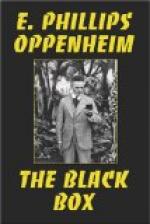2.
The windows of Mrs. Rheinholdt’s town house were ablaze with light. A crimson drugget stretched down the steps to the curbstone. A long row of automobiles stood waiting. Through the wide-flung doors was visible a pleasant impression of flowers and light and luxury. In the nearer of the two large reception rooms Mrs. Rheinholdt herself, a woman dark, handsome, and in the prime of life, was standing receiving her guests. By her side was her son, whose twenty-first birthday was being celebrated.
“I wonder whether that professor of yours will come,” she remarked, as the stream of incoming guests slackened for a moment. “I’d love to have him here, if it were only for a moment. Every one’s talking about him and his work in South America.”
“He hates receptions,” the boy replied, “but he promised he’d come. I never thought, when he used to drill science into us at the lectures, that he was going to be such a tremendous big pot.”
Mrs. Rheinholdt’s plump fingers toyed for a moment complacently with the diamonds which hung from her neck.
“You can never tell, in a world like this,” she murmured. “That’s why I make a point of being civil to everybody. Your laundry woman may become a multimillionaire, or your singing master a Caruso, and then, just while their month’s on, every one is crazy to meet them. It’s the Professor’s month just now.”
“Here he is, mother!” the young man exclaimed suddenly. “Good old boy! I thought he’d keep his word.”
Mrs. Rheinholdt assumed her most encouraging and condescending smile as she held out both hands to the Professor. He came towards her, stooping a little more than usual. His mouth had drooped a little and there were signs of fatigue in his face. Nevertheless, his answering smile was as delightful as ever.
“This is perfectly sweet of you, Professor,” Mrs. Rheinholdt declared. “We scarcely ventured to hope that you would break through your rule, but Philip was so looking forward to have you come. You were his favourite master at lectures, you know, and now—well, of course, you have the scientific world at your feet. Later on in the evening, Professor,” she added, watching some very important newcomers, “you will tell me all about your anthropoid ape, won’t you? Philip, look after Mr. Ashleigh. Don’t let him go far away.”
Mrs. Rheinholdt breathed a sigh of relief as she greeted her new arrivals.
“Professor Ashleigh, brother of Lord Ashleigh, you know,” she explained. “This is the first house he has been to since his return from South America. You’ve heard all about those wonderful discoveries, of course....”
The Professor made himself universally agreeable in a mild way, and his presence created even more than the sensation which Mrs. Rheinholdt had hoped for. In her desire to show him ample honour, she seldom left his side.
“I am going to take you into my husband’s study,” she suggested, later on in the evening. “He has some specimens of beetles—”




